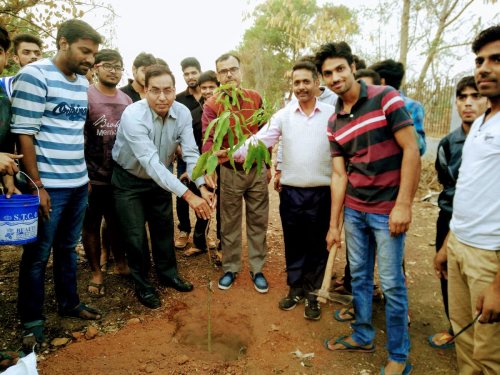Events
- FREE DANCE CLASSES
- BLOOD DONATION
- BLANKET DISTRIBUTION
- CLOTH DISTRIBUTION
- SEWA FREE HOSTEL
- FREE FOOD
- CARRIER GUIDANCE
- SPORT EDUCATION
- SLUM CLASSES
- JEE PREPARATION
- FREE LIBRARY KOCHHABHANWAR
- FREE LIBRARY BARAGAON
- Opening New Free Library
- JAN SEWA THALI
- SEWA ROTI BANK
- SWACCH BHARAT ABHIYAAN
- SEWA - PLANTATION DRIVE

SEWA - PLANTATION DRIVE
A free plantation drive organized by SEWA (Self-Employed Women's Association) can have various positive impacts on the environment, society, and community well-being. Here are some potential benefits and considerations for a free plantation drive by SEWA: 1. **Environmental Conservation:** - **Biodiversity Enhancement:** Planting a variety of native trees contributes to biodiversity by providing habitats for different plant and animal species. - **Carbon Sequestration:** Trees absorb carbon dioxide, helping combat climate change by sequestering carbon and releasing oxygen. 2. **Community Engagement:** - **Inclusive Participation:** Involving the community in the plantation drive fosters a sense of ownership and environmental responsibility. - **Empowerment of Women:** If SEWA focuses on empowering women through this initiative, it can provide training and opportunities for women to actively participate in environmental conservation. 3. **Educational Opportunities:** - **Awareness Campaigns:** The plantation drive can include educational components, raising awareness about the importance of trees, environmental conservation, and sustainable practices. - **Skill Development:** Training sessions on planting techniques, tree care, and environmental stewardship can be incorporated to enhance community members' skills. 4. **Economic and Livelihood Support:** - **Sustainable Livelihoods:** SEWA could explore ways to link the plantation drive with sustainable livelihoods, such as agroforestry or the production of non-timber forest products. - **Income Generation:** Plantations can contribute to income generation through the sustainable harvest of forest products. 5. **Social Well-being:** - **Health and Recreation:** Green spaces created by the plantation drive offer recreational opportunities and contribute to the overall health and well-being of the community. - **Community Building:** Planting trees together can strengthen community bonds and create a shared sense of purpose. 6. **Urban Improvement:** - **Urban Greening:** Planting trees in urban areas enhances the aesthetic value of the surroundings and helps mitigate the urban heat island effect. - **Air and Water Quality:** Trees contribute to improved air quality and can help with water filtration in urban environments. 7. **Long-Term Environmental Impact:** - **Ecosystem Services:** Over time, the planted trees can provide ecosystem services such as soil conservation, water regulation, and habitat creation. - **Climate Resilience:** A diverse range of trees can contribute to climate-resilient landscapes. 8. **Partnerships and Collaboration:** - **Collaborative Efforts:** SEWA can collaborate with local authorities, schools, businesses, and other organizations to maximize the impact of the plantation drive. - **Government Support:** Seeking support from government agencies for permits, resources, and technical assistance can enhance the success of the initiative. 9. **Monitoring and Evaluation:** - **Impact Assessment:** Regular monitoring and evaluation of the planted areas can provide insights into the success of the initiative and areas for improvement. - **Adaptive Management:** Flexibility in the approach allows for adjustments based on feedback and changing environmental conditions. 10. **Scaling Up and Replication:** - **Scalability:** A successful plantation drive can serve as a model for future initiatives, inspiring other communities and organizations to replicate similar efforts. - **Knowledge Sharing:** Sharing experiences and best practices can contribute to a broader understanding of effective approaches to community-based environmental conservation. In summary, a free plantation drive by SEWA has the potential to create a positive impact on the environment, empower communities, and foster sustainable development. It aligns with SEWA's mission of supporting self-employed women and promoting social and economic well-being.

